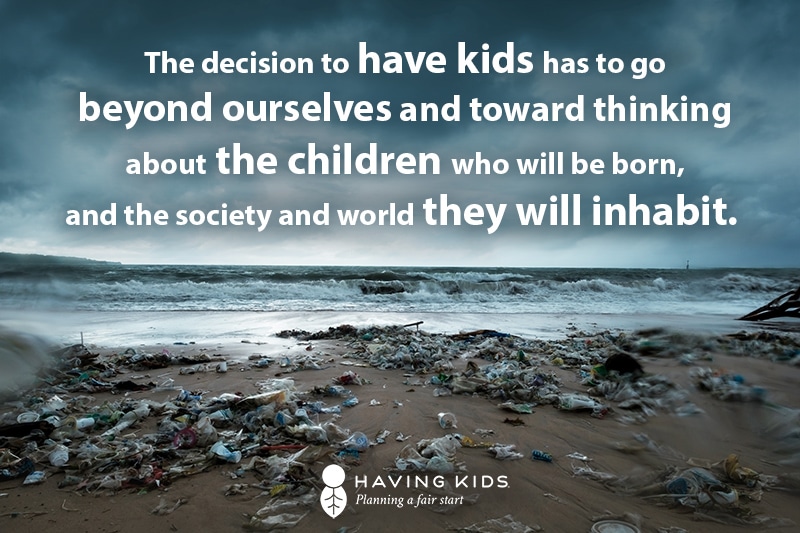The Fair Start Movement ensures that climate reparations and migration funds are paid from the wealth that created the crisis by externalizing its costs by ignoring human rights, and paid directly to young women so they can plan to have kids in a way that is consistent with at least the minimal obligations of the Children’s Rights Convention. This avoids past generations’ deadly mistakes — including, as described in Newsweek, putting anthropocentric over ecocentric environmentalism and never linking the Convention to reproductive rights regimes — that created the dangerous and unfree world in which we live today. We start at the source of the problem — birth inequity in its five dimensions — while others ignore it and quietly undo the good they claim to do in order to benefit wealthy funders. Infants and mothers in nations least responsible for the climate crisis are dying and suffering harm because of your fundamental error discounting the rights of future generations.
People, not documents, constitute nations, and the creation of their power relations through birth and development determines whether they are relatively self-determining or determined by others. These relations are part of the implied “we” in every statement, the often unspoken presence of the dominant political/legal system – usually the nation – from which the statement orients. How would you ever really account for inclusive power relations to allow a say in what the law should be without starting at creation and accounting for the move from minor to adult that makes persons full citizens capable of making the rules? You would not, and the failure to halt the climate crisis is evidence of this.
A young attorney from Nigeria, Esther Afolaranmi, has explained how to fix the modeling, and is pursuing and action before the United Nations Human Rights Council to ensure just climate reparations for young women, mothers, and infants. Her and others’ work lays out the roadmap of revisions — detailed below and simply referred to in Newsweek as child-centric planning. COP 28 Leadership needs to fix its deadly modeling and become compliant with fundamental human rights. Acts of mass violence do not stem from mental illness as much as from a sense of disempowerment, and the need to matter in one final act within what shooters perceive as an unjust world. Social justice movements such as Fair Start can slowly halt the violence by redirecting those who feel dangerous levels of desperation to instead assist in the nonviolent moving of concentrations of wealth and power from those who benefitted from the systems that disempowered the average person toward young women to physically constitute — through better family planning — just societies in which people are actually (measurably) empowered.

Dear COP28 Leadership,
Please consider the following truths:
1.
Your deadly cost-benefit modeling, which can be easily revised, is blocking fundamental life-saving solutions to the climate crisis: Family reforms that reorient entitlements to ensure climate restoration, as well as resilience-building resources for children who need them.
- COP 28 Leadership is using fundamental growth-based (rather than child rights-based) policy, baseline and cost/benefit modeling that is a proven failure and that has undone more than three-fourths of the climate mitigation efforts over the last few decades, putting tens of millions of lives at risk. Your model error contradicts encyclopedic philosophy that has been widely accepted, published by Stanford University, since at last 2003. Just on the measure of simple welfare, your most basic modeling, described further below, fails. Reliance on basic norms other than a just creation (or birth and development) norm as a logical fallacy and engaging in the fallacy fails to limit and decentralize the power others have over us. COP 28 Leadership can, in its members’ official and unofficial capacities, engage in the various steps outlined in Section 4 below, to correct this failure and save countless lives. Public action around entitlement programs — changing the basic model — have saved countless lives in other contexts, like the reduction of famine. Your model makes the same mistake that caused the crisis: exploiting children for growth-based economies, in violation of their rights, rather than investing in them. Growth is largest driver of climate change and the larges inhibitor of climate resilience.
- This is simple: Infants are being harmed by the crisis, so fundamental change begins by altering the conditions in which they’re born and raised, and the resources they have. Wealth at the height of the economic pyramid was made by harming these infants, so we should use the wealth to alter those conditions and provide resources. We should not constantly compound the problem. Your modeling to the contrary moves the goalposts on climate reparations, reducing the reparations and ignoring how human rights mandate we spend them.
- The modeling is based on a Eurocentric vestige of colonialism — the historic entitlement of wealthy families to exploit birth positionality relative to parents in colonized nations — which nests in the human-rights regime. Instead of ensuring well-accepted notions of intergenerational justice through simple birth equity entitlements — which create birth and development conditions that would ready children for the climate crisis while drastically reducing emissions — world leaders exploited them as consumers and cheap future labor in ways that exacerbated the crisis and violated the Children’s Rights Convention. The wealth taken from that process, which would otherwise constitute deadly birth-based inequity enforced by the constant threat of state violence, must be repaid as climate reparations directly to future generations by changing the conditions of their birth and the resources they possess. Such a move years ago would have evaded the worst of the crisis. You can’t mitigate and reverse the crisis by starting from a choice to create more victims rather than hold to account those who benefited most from the crisis.
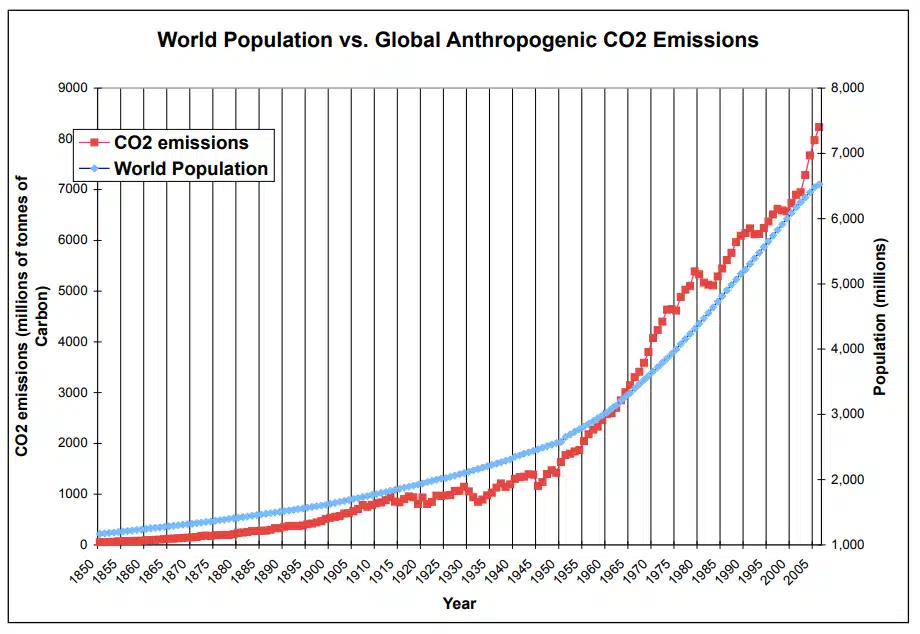
The growth-based modeling you use undercuts the object values that enable self-determination, as described in Section 2.
- The modeling does nothing to ensure children minimum levels of welfare in their birth and development conditions because those children are instead treated as economic inputs. There are approximately 6,700 newborn deaths every day because your model does not require planning entitlements. The climate crisis will only increase those numbers. One other acute cost of your “growth for profit” model? Constant child abuse by unready parents (it is estimated that up to 1 billion children aged 2–17 years have experienced physical, sexual, or emotional violence or neglect recently). Consider the cost, in simple terms of efficiency, of treating humans capable of so much as mere economic inputs, killed and abused as art of the system of growth meant to benefit a few.
- The modeling ensures that climate emissions and other deadly forms of ecocide are exponentially multiplied in ways that will kill many, including the infants mentioned above. That is not a sustainable system.
- It exacerbates birth-based inequity, ensuring those least responsible for the crisis suffer its greatest impacts, which risks violent destabilization, as the world’s poor vastly outnumber those who have absorbed the most benefits.
- The modeling undercuts your own legitimacy by diluting the average citizens’ influence over their governments, and thus international bodies, which is inherently unsustainable. At what point do figureheads cease to represent at all? In many areas, that threshold has been crossed. Climate reparations are a chance to reorient the entitlements toward families bottom-up creating inclusive democracy, not the evidently failed growth-based economies the crisis threatens.
- Many will use modeling that does not contain these errors when assessing damage and the reparations owed.

- The error you make, the one blocking these reparations, can be described by simply assessing costs and benefits in the manner done in derogation of our first being – existing as politically empowered and participatory groups of mutually self-determining persons capable of making such assessments, and in ways that are inclusive and reflective of the group constituents. Conversely, the climate crisis represents the ubiquitous – through our environment – influence of others against our will. This error resulted in benefit to some at deadly cost to others, and robbed systems of legitimacy, systems in which free persons will make their compliance with the law contingent on being equally empowered to determine its content, and with it control the influence (including climatological) others have over them. Your statements, and the underlying model you rely on, interfere with what is essentially the lien on wealth represented by climate reparations, reduce what the reparations should be, and hide the most effective uses of those funds.
- COP 28 Leadership can, in its members’ official and unofficial capacities, engage in the various steps outlined in Section 4 below, to correct this failure and save countless lives. The error we describe has been described by Nobel laureate Steven Chu. If a Nobel laureate economist calls the inequity and growth in your model a Ponzi scheme and finds accord with dozens of other laureates, we should all expect those harmed by the scheme to be repaid. If we are witness to ecocides that threaten more lives than those taken in the world wars, we should expect a sea change in authority and a rejection of an obligation to follow the laws of those who failed us. Family planning entitlements work in both of these regards.
- The base modeling you use now ignores the impact of growth and the externalization of deadly costs, discounts the rights of future generations, leads directly to the failure of the Paris Agreement, and is creating a fantasy world of misinformation that is costing lives. The crisis is not just about emissions, but how we experience the impacts, both of which in the long run depend (based on findings by Yale University) on the key family policy and entitlement changes your modeling error blocks. Family reforms go beyond emissions to determine child welfare, resilience, lifelong equity, democratic participation and other crucial factors. To the extent it harms innocent children to ensure profitable growth, your continued use of a deadly model makes you culpable.

- The current COP 28 Leadership modeling intentionally ignores the greatest long-run solution to the crisis recently lauded by over one-third of Nobel laureates: fairness and incentive-based family reforms that reorient entitlements to ensure climate restoration, as well as resilience-building resources for children who need them. The growth-based modeling ensured deadly ecological harm while directly limiting the ability of average persons as democratic citizens to effectively participate in government in order to address the harm.
- Instead, your modeling uses the same growth policies that are harming children in order to benefit — as cheap labor, consumers, and taxpayers — the very businesses destroying these children’s environment. They, and you, do so in violation of the Children’s Rights Convention and the Human Right to a Healthy Environment. These businesses pretend to decrease impact through different modes of consumption, while undoing the benefits and loss of profits by quietly pursuing policies to simply create more consumers (and cheap future labor driven by birth positionality). Your process of hands-off family planning to ensure economic growth in order to benefit elites has ensured an estimated 1 billion children aged 2–17 years, have experienced physical, sexual, or emotional violence or neglect in the past year, and destroyed environments in ways that will cause billions to soon migrate.
- Because the Children’s Rights Convention details the minimum standards that children need to comprise human rights-based, or legitimate, nations and bodies of international law, and because your model does nothing to limit children to being born and raised in these conditions but rather exploits them as economic inputs, your base modeling fails. While concentrations of wealth and power are terrified of correcting this failure, and have interfered with efforts to do so, this change will save countless lives.
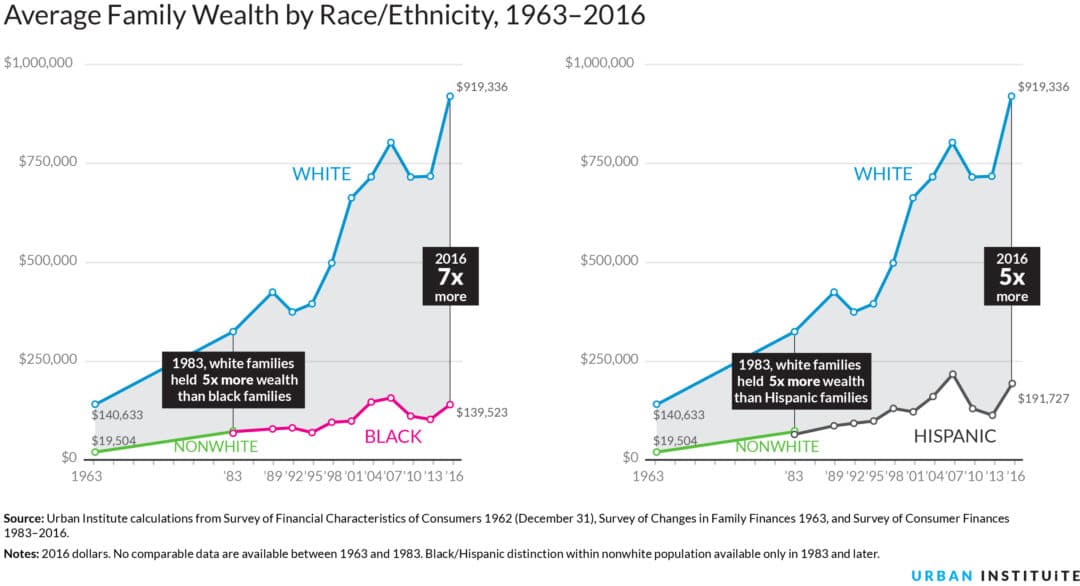
- Your modeling can simply be described as anthropocentric instead of liberatingly eco-centric, and it repeats the same basic mistake that many mainstream environmental organizations – funded by extreme wealth – have made and that fundamentally led to the climate crisis, as detailed in this Newsweek piece. These organizations, their media, and certainly their funders, are unlikely to admit they failed in something as ethically simple as whether family planning is better based on unsustainable growth — or constitutive child equity — and contributed, partially through exacerbating inequity, to the likely death of millions.
- In the climate crisis, birth and development reparations taken from wealth and given directly to families can save lives and restore biodiversity. Decolonial scholars have described family systems that can be truly democratic in this regard. We can leave ill-begotten wealth based on externalizing deadly costs at the top of the economic pyramid, and millions will die, or we can pay it back to the future generations: those on whom its true costs are being imposed. This is about bottom-up power — it’s relational — not just population or people as numbers. And based on many peer reviews, nothing has greater impacts on basic values we all share. We can choose freedom, justice, and decolonizing the future, and start by being fair.
- Direct action activists who view themselves as freedom fighters may pursue nonviolent means against leadership, to change the model, as detailed in this Newsweek piece and other writings that specify targets whose resource reallocation to those harmed by the crisis could expedite long-run decolonization.
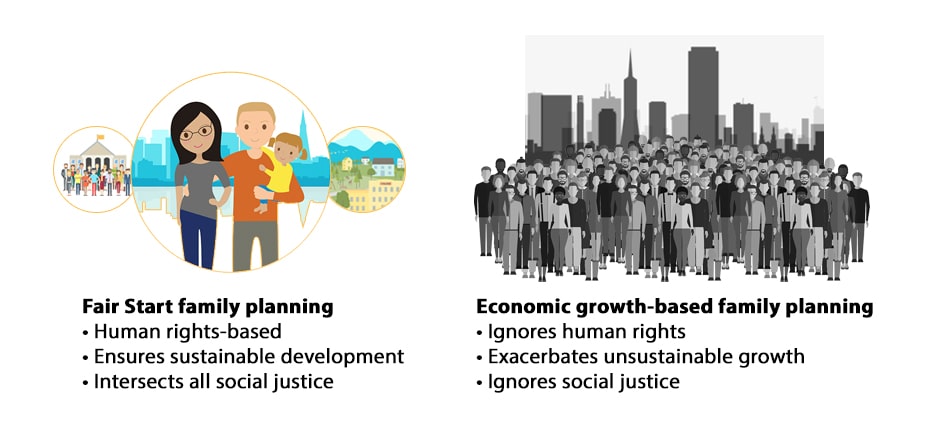
- This move would reverse racist ecocide, taking decolonization to its logical conclusion and a new level by liberating the most vulnerable — future children and nonhumans — at the same time through eco-centric and equitable family reforms. We cannot decolonize using traditional Eurocentric family models that treat future persons and the nonhuman world as resources to be exploited. Instead, we have to empower them with a norm that ensures biodiversity and minimum levels of welfare and equity. I cannot limit and decentralize the power others have over me, and I over them — we cannot be free — without ensuring birth and development conditions consistent with mutual self-determination, which requires delaying having kids until parents are ready to parent well (not torturing one’s infant to death, for example), allocations of wealth that ensure all children equal opportunities in life not defined by race, and smaller or more eco-centric families for all — the most effective climate solution. Freedom is not possible without this change, and many leading philosophers seem to agree. Not ensuring these things slowly converted the liberating possibility of town halls filled with empowered citizens in a biodiverse world instead into shopping malls filled with workers and consumers enriching a few, and created a pre-constitutional world where we are all subjected to others’ ecological impacts against our will, some are born to slave for others’ benefit, and we are controlled by governments over which the average person has no control. Free persons will target those who benefitted from this process, to pay what they owe to end it, turning shopping malls back into town halls, in a restored climate and a world filled with nature. Decolonization means pulling the right high-profile levers to change entitlements and reverse the power polarity, replacing mostly white men with wealth-based authority from above ensuring a life for all of market or employment-based incentives, to other identities first empowering children, biodiversity, and inclusive democracies with family entitlements and incentives — that override all — from below.
-
Consider it this way: One way to think about what is right and wrong involves legal baselines. What Professor Lawrence Solum does not say is that by his paying taxes, following the law and role modeling the need to do so to others, making money on growth-based investments, and reifying the institutions that influence behavior, etc., he chooses to orient from a very specific baseline as he writes about them. And it’s a baseline that causes harm — a lot of deadly harm — to those who have no control over it. But he never mentions his positionality, including his not being born in, say, 2050, as he writes. He never specifically accounts for the fundamental birth-based creation of actual power relations and legal obligations — that phase which is required for self-determination — in his writing that summary of baselines. That is the matter with which this letter is concerned. At the end of it below, we detail an alternative way to live, one where free people condition compliance with laws on those laws first and fairly limiting the influence others have over them.
- All of this means that Professor Solum should back the concrete demand for resources described at the end of this letter as the first ought or obligation, that set of entitlements that justify any system of governance. And he should back the demand not in the abstract, but against specific targets like John T. Raymond, and with payments made to specific beneficiaries in Uganda, under a system of women-led democratic decision-making that came before any of the white and Western thinkers he cites. How else do we even begin to describe systems that are inclusive and representative of their members? How could we ever approach the ideal of something like animal law, or a system that actually protects the most vulnerable? Or are we abandoning those ideals? We can do better by orienting continued human existence from a just position.
2.
The fundamental policy, baseline and cost-benefit modeling error involves your misunderstanding your most fundamental obligation to remain legitimate in your governance: The obligation to ensure and maintain systems of relative and actual self-determination for all. This claim is backed by several peer reviews and supporting statements from leading philosophers.
- Your statements and work to date precede from this incorrect assumption about political obligation, and your authority to act in the climate crisis. That obligation and authority does not flow top-down from documents; it flows bottom-up from the creation of empowering relations — among people, and between people and their ecologies.
- If we take freedom, or a relative state of self-determination, as our most basic value (many act as if they do, and many have died and will die to further that value), then we are obligated to fundamentally rely on a system of obligation that enables each subject to limit via law the influence others have. The failure of our current systems to fulfill this condition — to actually account for the creation of power relations — can be explained by the positionality (social and intergenerational) of those who created them and the undemocratic influences they were subject to.
- Our brains are designed to bypass this logical starting point and look for concrete symbols rather than complex but real relations, at risk to our species. The failure of laws meant to protect animals, with its proponents focusing on the word “animal” rather than basic human-nonhuman relations, is a clear example of this. Sensational but myopic animal-rights campaigns focused on factory farming or animals in shelters, as we slowly overrun the nonhuman world into extinction with growth-based markets, is a scam many used to just make money.
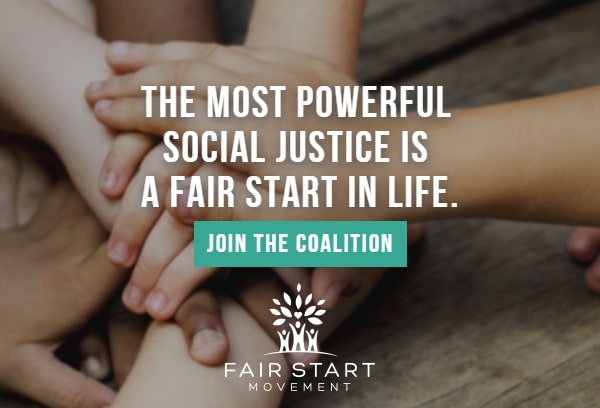
- Self-determination occurs in empowering conditions of birth and development that flow from a based creation norm where absolute self-determination is inverse to growth, relative to nature (or the absence of human influence), or 0123…0, which entails climate restoration via birth equity as the fundamental human right, thus pointing toward future population ranges specified by Sir Partha Dasgupta and Dr. Chris Tucker. In other words, if people are democratically empowered under human rights — if free, equal, and thus self-determining — they will offset each other equally, relative to nature or the nonhuman world. The idea of self-determination makes no sense against a background constantly influenced by others. All human behavior orients from some level of coercive obligation to a legal/political system that after the advent of liberalism, is justified because of some relation to fairness, participation, inclusion, representation, etc., in political units separated by neutral/nonhuman/natural areas, such that the collective is a form of the self. What more basic norm could precede or better describe the idea of freedom and political equality? None could — and there is no freedom without a fundamental norm that is this objective. We become free with a starting point of actually not exploiting the most vulnerable: future children and nonhumans.
- If we do not account for fundamental values, ones we all share, in the act of creating others, and thus in the formation of fundamental power relations, we risk undoing those values. That is, in fact, what has now happened, with a few benefiting at a deadly cost to others. Your model error contradicts encyclopedic philosophy that has been widely accepted, published by Stanford University, since at last 2003. The fact that humans are not separate from nature is now well-established but descriptively complex. But as a normative matter — that we should not be separate from nature — is captured in ecocentric liberation of the inverse growth model described above. Forget nation-states: Such political units might look more like unionized corporations in the modern world, constantly forming and dissolving, albeit with conditions that reflect the application of universal human rights.
- If we really value self-determination, which is the premise of current U.N. family and reproductive rights policy, then all – as political equals – should have equal influence over most basic rules that control how others actually influence us. The sovereignty of any group derives only from the sovereignty of its members. If we value relative self-determination and a one person-one vote system, then the first human right, primary obligation, and most basic and overriding rule is a rather specific set of procreative ethics, laws, and policies that reverse the current system of growth, and instead start with deontological population ethics that look to create political units akin to the 0123…0 described above. If people are really free because they are empowered at birth, if we take human rights and democracy seriously, growth is seen as slowly disenfranchising absolute self-determination, which is acceptable within a certain range not exceeding – at most – ecological carrying capacities.
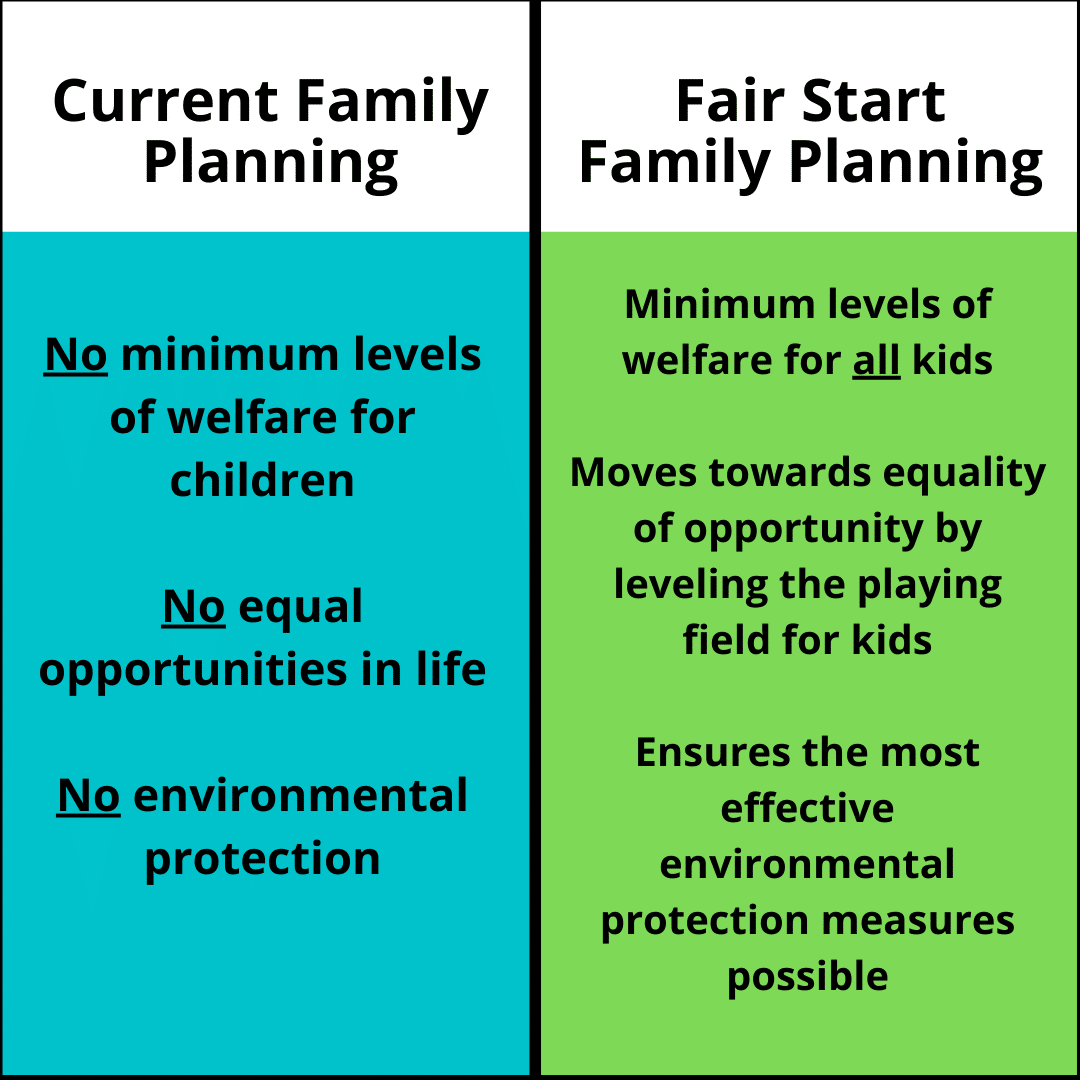
- This is about choice. No reasonable person would choose to come into certain conditions of birth and development below a particular threshold. No reasonable member of a political unit would choose to allow persons, with whom they must eventually share power, to come into certain conditions of birth and development below a particular threshold. And no reasonable person would ignore the number of persons entering a political unit because they would lose choice through vote dilution. Instead, the zeitgeist in wealth-backed media today sees women as not having enough children in the middle of the climate crisis as a baby bust of exploitable infants. As the crisis deepens, this will change and the wealth behind that messaging should expect to pay, not exploit. Liberalism has been plagued by not knowing how minimally communitarian or other-regarding one has to be a member of a political unit without losing self-determination. The Children’s Rights Convention – to use objective levels of investment to physically constitute ourselves as free or self-determining persons – becomes the clear answer.
- In other words, we need to fit everyone into human-rights-based and democratic town halls, separated from the influence of other town halls by nature, so we can all actually regulate economies more generally, or to even decide how to have representatives do it, how to federalize, which areas of life not to regulate, etc. We can’t create billions of happy consumers, workers, and taxpayers for shopping malls, high in quantity and irrespective of civic quality, without losing the relative self-determination of instead having created fewer numbers of highly developed, self-determining, and politically equal citizens for the town halls. What is a good test for the latter obtaining in the world? Assessing whether fundamental political units can break into functional constitutional conventions, or whether, without external forces holding persons in place, they would devolve into chaos. Disenfranchising through growth, and then profiting from the struggle of persons to matter or regain their role through things like social media, and belonging/inclusion-based consumption, does not set a good stage for such a convention.
- Imagine creation as a start line in a race. To be fair, you want horizontal equity with the other racers, and vertically with prior generations so they have not compromised the self-determining nature of the racetrack. To ensure this, the fundamental creation of power/obligation relations – our birth and development – should have been determined over the past several decades by incentivizing resources that would have ensured birth equity for all children, and equal influence over the laws under which we must live. That never happened. Yes, Donald Trump is a threat to democracy, but he is a symptom of the disease of documented oligarchical family policies antithetical to democracy, the disease that nests in unfair “private” family policies based on white supremacy, inequity, and the exploitation of nature.
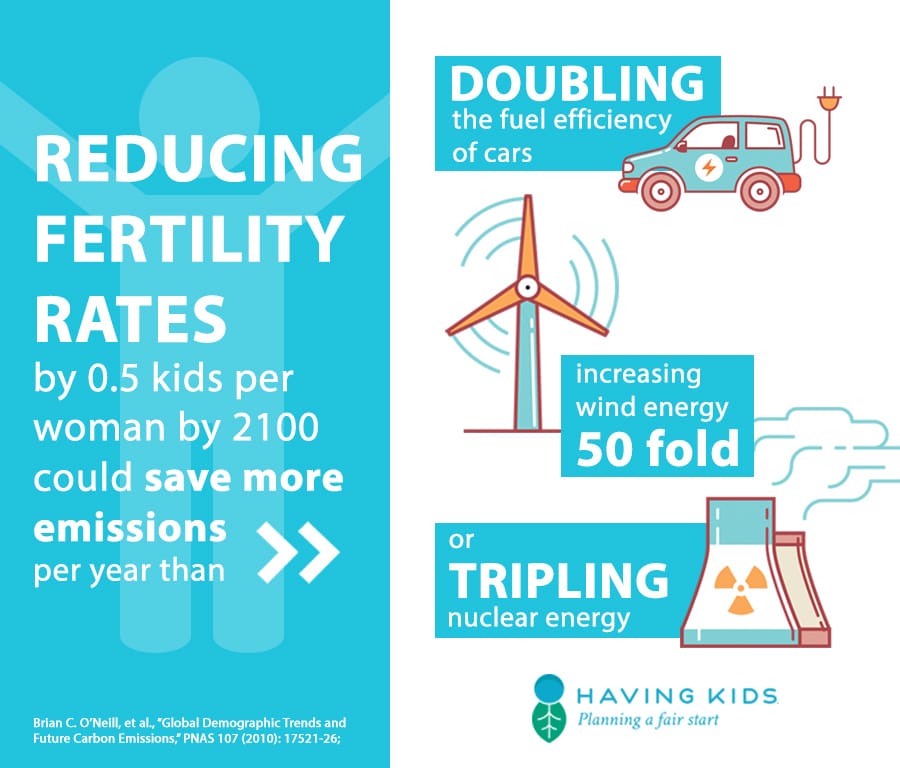
- To treat any conflicting rule, including the current state-issued property rights of the wealthy, as more primary and controlling than the self-determination rule described above, would be fundamentally fallacious. Your statements and modeling show you engage in this fallacy. You can make statements, remodel your cost-benefit analysis, and do other things, to the contrary.
- The current and contrary United Nations formulation of reproductive rights is a Eurocentric vestige of colonialism, and a failure that – as shown above — fundamentally caused the climate crisis and vast inequity. It has no standards for child welfare, environmental protection, birth equity, or participatory democracy, nor is it even sustainable on its face. It is blatantly racist, and ecocidal, continuing historic, unjust relations under the veil of autonomy. According to research that has earned seven positive peer reviews, it has no basis in legal or political theory, bioethics, or international law, starts from the inherently contradictory concept of procreative autonomy (how can creating another person be an act of autonomy?), and contains multiple other errors that make it inconsistent with human rights (including simply being unsustainable). It was formulated to avoid wealthy elites from having to reduce their children’s unearned privileges and level the playing field for all children, while ensuring a hands-off approach to family planning that created a profitable arc of growth for relatively few people at cost to others. UN and COP officials have ignored previous warnings to correct the error, despite dozens of ways to accomplish this. That decision – by evading effective family planning entitlements — has cost many innocent lives and has only benefitted concentrations of wealth and power that stand to lose from child-centric planning reforms. If world leaders intend to use force to maintain a status quo that puts millions of lives at risk, justice entails showing this to be the case, especially to those who wish to take direct action to protect those lives.
- Even if law, ethics, and policy should revolve around parental subjective choice, the mistakes that have led to the crisis have stymied the rights of untold future parents to have children in safe conditions, free from others.
- The failure of the international human-rights system to protect the right to an abortion is indicative of the larger failure of family policies. The right is best based upon the interests of future children and communities, not just bodily autonomy, and that emaciated basis explains why the right is now threatened.
- Child-centric family reforms — centered on parenting delay, birth equity redistribution, and an ethic of smaller or more ecocentric families — would entail family planning investments in birth and development conditions, investments high enough to limit growth towards the optimal population ranges specified by Dasgupta and Tucker. That would require the opposite of the policies now in place (the ones lauded by conservatives and socially liberal commentators), and the opposite of a culture of unsustainable growth based on insufficient social and ecological birth conditions for children. This would require delaying having kids until parents are ready to parent well, allocations of wealth that ensure all children equal opportunities in life not defined by race, and smaller or more ecocentric families for all — the most effective climate solution. Freedom is not possible without this change, and many leading philosophers seem to agree.
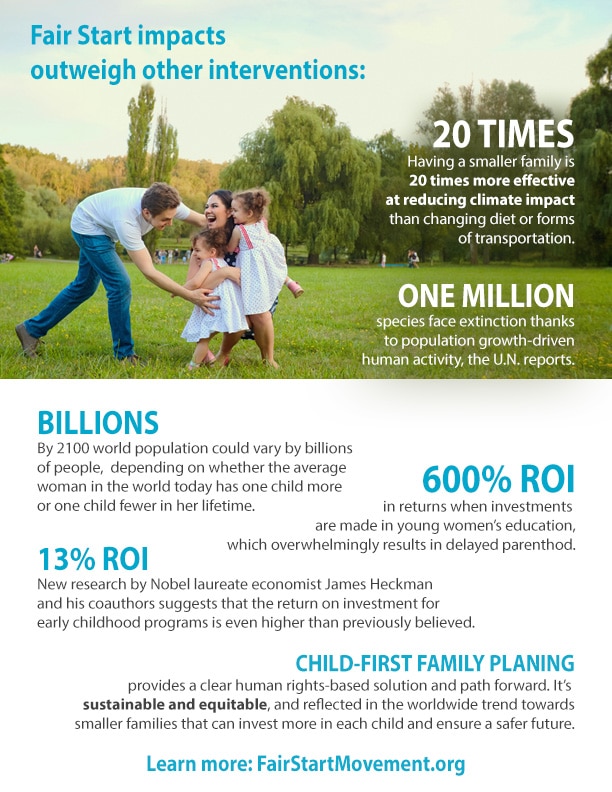
- Abstract academic debates about population ethics, often funded by concentrations of wealth and power reliant on inequity and growth, threaten to exacerbate the results of the climate crisis by forestalling law and policy reforms. Many of the debates derive from the same Eurocentric vestige of colonialism described above – the historic entitlement of wealthy families to exploit birth positionality relative to colonized nations – nesting in the human-rights regime. Most of the academics in these debates contradict in their writings the basic values they exhibited throughout their lives, e.g., seeking minimum thresholds of personal welfare, expecting equal access to opportunities, participating in and adhering to political/legal systems that purported to represent the governed, using and enjoying an environment relatively conducive to human and nonhuman health, etc. Given their privileged intergenerational positionality, and the fact that they sent their lives generally relying on and participated in legal/political systems of coercive obligation that benefitted them at cost to others, they should at least begin from a default or provisional position of extending those values to future generations by saying — as a fundamental premise of justice over top-down power — that basic human-rights systems should prioritize the child welfare/equity in instruments like the Children’s Rights Convention over parental subjective choice in the ethics, law, and policy of family planning, population, and procreation so that future generations can also debate these issues from the comfort and security these academics do. Again, the model error that is the premise for many of these debates contradicts encyclopedic philosophy on intergenerational justice that has been accepted, published by Stanford University, since at least 2003.
- Authority to govern derives from people, whose capacity to govern derives from empowering birth and development conditions that emancipate us into adulthood. Free people will condition compliance with the law on it first empowering its subjects, through the conditions of their birth and development, to shape the law, and thus fundamentally limit and decentralize the power others’ have over them. No matter what someone says, most will act as if they value the self-determination this rule reflects, but they either misunderstand how it works or wish to increase their power at cost to others. The equity the left wants, used as the basis for creation, gets us the autonomy the right wants.
- Free persons will target those who most benefited from process of family-based disempowerment, to pay what they owe to end it, using family reforms to turn shopping malls back into town halls, in a restored climate and a world filled with nature. Is it really that wrong to simply want to be empowered? The border of human power is not a series of lines a map. It’s the edge of the creation and development of the persons from whose authority line drawing derives. Savvy freedom fighters, not tricked by the human brain’s tendency to think in the short term and ignore the unity of value once we think long-term, won’t overthrow governments. Those who want to matter and make their life count toward others will overthrow bad family planning and parenting to create instead the conditions, and polarity, where organizations of free and equal persons can form, dissolve, and reform — more like bubbles than an extended organizational chart — given the right creation and background conditions. And the way to do that is by taking the wealth created by years of bad family policy and using it instead to entitle young women to plan their families, and physically constitute free and just communities. Savvy freedom fighters will physically constitute nations, not be constituted by some document or documents to which they have, and can only have, little relation.
3.
The fundamental policy, baseline, and cost-benefit modeling error can be easily corrected, beginning with simple informal statements by COP 28 Leadership that show support for every child’s overriding human right to a fair start in life. Start by telling the truth. There are legal, financial, cultural, and other vectors below.
- Simply tell the truth: Admit publicly your errors, described above, which has exposed millions of those least responsible for the crisis to its deadliest effects. Admission of the truth enables change and can save lives. Admit publicly that all children deserve a fair start, concretely defined as climate restoration via birth equity entitlements, and that living according to such a fundamental obligation – the most fundamental obligation – is a necessary condition of human freedom and the legitimacy of governance. Urge your adult children to join you in these admissions, because they can lay a key role in creating a change towards child-centric, or constitutive, systems.
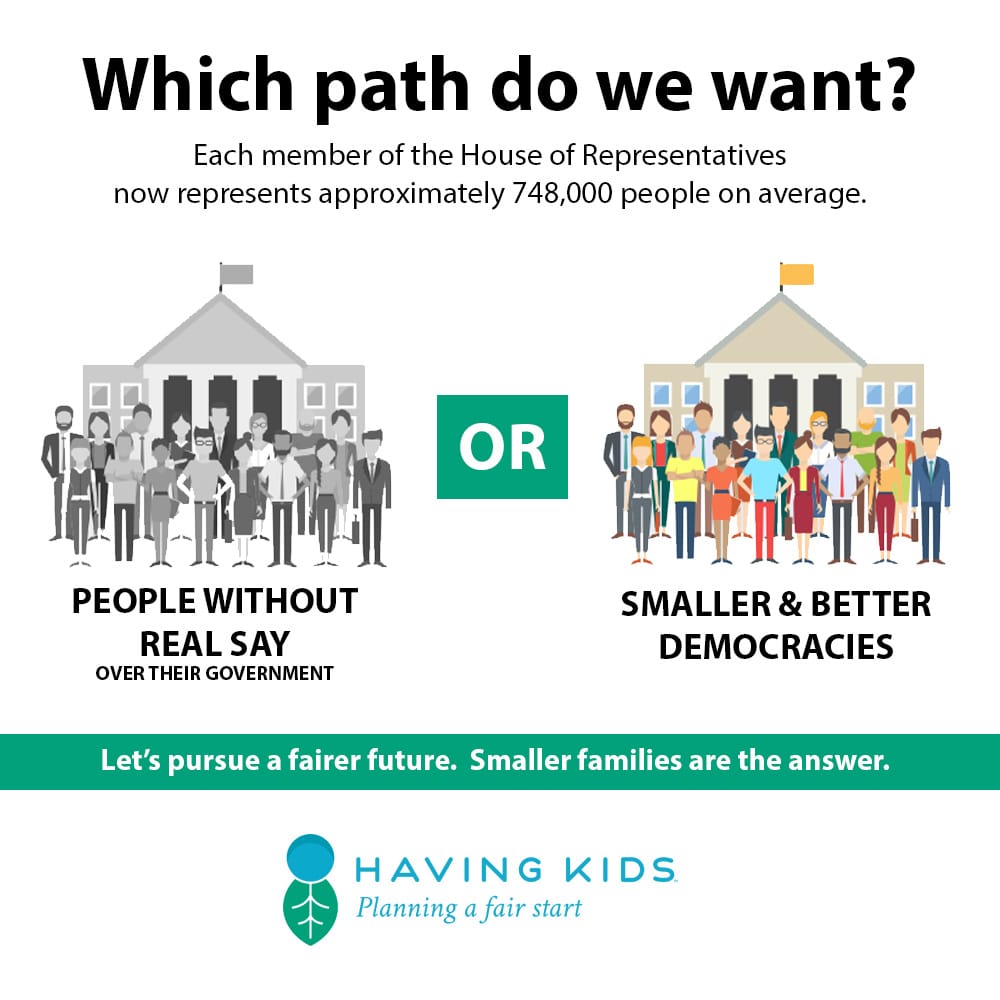
- Give your own money as obligatory reparations, leading by example: Many are already moving forward to give money as part of child-centric family reforms that correct the errors described above. You can, too.
- Encourage affiliating with Fair Start-certified companies, nonprofits, celebrity brands, funders, and other entities, as the certification process unfolds next year. Fair Start certification is the antidote to the exploitation of the most vulnerable – nonhumans and future persons – as the most just and effective solution to the crises we face today. That is how we achieve fundamental justice for every person born and for future generations. 1) Uses international human-rights law, not purely domestic standards, which is required for the climate crisis – but in a way that includes domestic remedies. 2) Sets the highest standard for climate reparations rather than undercutting victims’ claims. 3) Mandates direct family-based reparations, which have the greatest impact. 4) Corrects the baseline error or fallacy discussed above, including climate migration and pro-labor/equity employment policy changes.
- Back international human-rights, domestic constitutional, legislative, regulatory and other reforms that ensure eco-social birth equity compliance, and thus safety and freedom. Don’t undercut your own legitimacy.
- Support with public statements green- and growth-washing litigation targeting the lies from companies, nonprofits, academics, and media that caused the crisis and threaten the death of millions. To the extent the lies furthered inequity, support unionization of the targets to ensure change. Concentrations of wealth and power to create commercial noise in media, through nonprofits, and otherwise, that drown out simple truths – like the value and impact of fairness.
- Acts of mass violence do not stem from mental illness as much as from a sense of disempowerment, and the need to matter in one final act within what shooters perceive as an unjust world. We were sold sustainable town halls where we matter and can control the world around us to a degree, but got unsustainable, massive shopping malls where most do not matter and have no say.
- Social justice movements such as Fair Start can slowly halt the violence by redirecting those who feel dangerous levels of desperation to instead solve the underlying problem by physically constituting – through better family planning – just societies which people are actually (measurably, via the inversion test above) empowered. This move is analogous to public health interventions that have worked in the past. These changes can mitigate the role that rising temperatures will have in exacerbating gun and other forms of violence.
- Recognize that not engaging in direct action could be an abdication of freedom. For example: Would it be wrong for a young intending mother to secure birth equity resources from a family that externalized the deadly environmental and social costs of its wealth upon a child she wished to have, and then exploited birth inequity and growth to not only harm her future child, but ensure that child would be likely to work at penury for the wealthy family and their children, with her unable to even challenge that injustice through participatory democracy where her voice mattered? If she were charged with trespassing in making the demand, could she challenge it — and expect a jury to side with her — because the state cannot limit access to property without first empowering (constituting) its people to be involved in the making of such property rules, i.e., empowering them through just the sort of constitutive discourse in which she seeks to engage? How do we ever get to governance by the people without elevating her right above the process-based rule of trespass? Do we really choose to constitute our relations via top-down force in a system run by men versus in a system of bottom-up empowerment run by women via care? Even if we could fund the latter with the wealth taken by the former?
- For all the reasons given above, many would consider her taking peaceful action to achieve birth equity for her future child, and for all future children, and even against international figureheads blocking her way, the height of working toward freedom and justice. There would be serious winds at her back: Countless children’s lives such a sea change in entitlements would save from early death, the billions who would get a fair chance rather than be born, work for the wealthy, and die — all in poverty, the countless animals who would not suffer and die in the deadliest phases of the Anthropocene, and the billions whose voices would actually matter in functional democracies.
- She can leave that money there, or move it and save lives. Those on whom she would make the demands — who would choose preventable deaths — seem tiny and worthy of targeting relative to all of that. Her move to demand is a move toward knowing her child, under the tests laid out by one of the leading political philosophers in the world, will live free.
What COP 28 Leadership does now will assist in determining how such events unfold.
